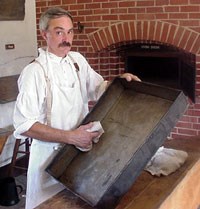
The logical time to clean the utensils, as well as the room itself was each morning after the dough had been molded and left to rise, a period of one to one and one-half hours. The general mess being over, there would be little left to clean after the baking except the pans. Wooden dough troughs had to be cleaned at least once a week according to later regulations. Whether this was done regularly in the early part of the nineteenth century may be questioned; nevertheless flour, yeast and dough in the cracks of the troughs would have attracted vermin and encouraged bacteria (not fully understood at that time) and account for sourness in the bread. To counteract this, the troughs were scraped and washed with a lye solution and then placed in the sunlight to dry. Meanwhile the bakers brushed and cleaned their shelves, tables and scales, swept the floor, and aired the building. A new iron pot was to have a handful of hay or grass boiled inside it before it was used. It then was scrubbed with soap and sand, filled with clean water and set on a fire to boil half an hour. Old-time cooks knew that iron utensils needed tempering before they would cook right. The tin pans used to bake in were filled with boiling water in which a spoonful of soda had been dissolved and set near the fire. The soda made the rosin used in soldering the sides soluble. The pan then was scoured with soft soap and rinsed with hot water. After the bread was baked, the pans were scrubbed with sifted wood-ashes or in boiling water, sometimes laced with lye. Grease left in the vessels could become rancid and make the bread taste bad. The pans were dried to prevent rust and put away. Knives were cleaned with soft flannel and bath-brick, a very old method of polishing metal. Rusty knives were rubbed with wood-ashes and a freshly cut portion of a potato to remove spots. When everything was put away, tired bakers must have removed their fatigue jackets, closed the doors and windows (in the summer), and made their way to their barracks. The odor of freshly baked bread, however, must have been a pleasant one to drilling soldiers and busy officers alike, as it wafted across the parade ground. Information for this page was taken from the Historic Furnishing Plan for The Bake House by Sally Johnson Ketchum.
|
Last updated: July 26, 2016

